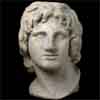Conquest and Colonisation timeline
Thutmose I extends Egyptian control as far up the Nile as Abu Hamad
The Amarna tablets contain extensive correspondence between the Akhenaten government in Egypt and subject princes in Phoenicia

Mycenae prevails as the dominant power throughout the Peloponnese and the entire Aegean
Citium, in Cyprus, is the first of many Phoenician colonies in the Mediterranean
The traditional date of the founding of Carthage (supposedly by the mythical queen Dido, but in practice by Phoenicians)
The Assyrians overwhelm the north of Israel and the ten northern tribes vanish from history - the majority of them probably dispersed or sold into slavery
The island of Sicily is colonized from the eastern Mediterranean by both Phoenicians and Greeks
The Assyrian king, Sennacherib, destroys with great brutality the city of Babylon
Byzantium (the future Constantinople) is founded as a colony of Megara, a Greek city-state
The Egyptian city of Memphis falls to an Assyrian army, soon to be followed by Thebes
After a long siege Jerusalem is taken by Nebuchadnezzar and the city, including Solomon's Temple, is destroyed
Larache is founded as a Carthaginian colony on the Atlantic coast of Africa
Sardis, the capital city of the Lydian ruler Croesus, is taken by the Persians
A Persian army captures Babylon and brings it into the empire of Cyrus the Great
The Persians defeat an Egyptian army at Pelusium and then capture Memphis
The Athenians, capturing Melos, kill all the males of the island and sell the women and children into slavery
A Carthaginian army lands near Marsala to begin the long involvement of Carthage in Sicily
The Romans capture the nearby Etruscan town of Veii, beginning a long process of territorial expansion
Before departing for the east, Alexander destroys Thebes and enslaves the Thebans for rebelling against the League of Corinth

While in Egypt, Alexander founds Alexandria – the best known of the many towns he establishes to spread Greek culture
Moving northeast into Mesopotamia, Alexander again defeats Darius III (at Gaugamela), leaving Persia open to his advances
Alexander takes a major new step, leaving Persian territory and moving through the mountain passes into India
Ptolemy begins to transform Alexandria into a centre of Greek culture, founding his famous 'museum' and library
Some 20 years after the death of Alexander the Great one of his generals, Ptolemy, extends his rule from Egypt to include Jerusalem







